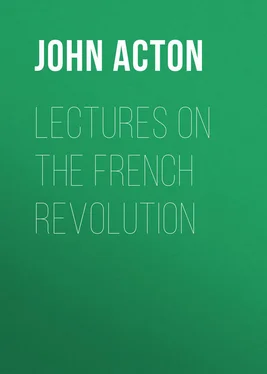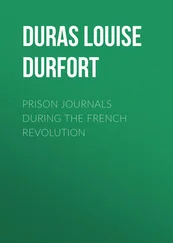John Acton - Lectures on the French Revolution
Здесь есть возможность читать онлайн «John Acton - Lectures on the French Revolution» — ознакомительный отрывок электронной книги совершенно бесплатно, а после прочтения отрывка купить полную версию. В некоторых случаях можно слушать аудио, скачать через торрент в формате fb2 и присутствует краткое содержание. Жанр: foreign_antique, foreign_prose, Историческая проза, на английском языке. Описание произведения, (предисловие) а так же отзывы посетителей доступны на портале библиотеки ЛибКат.
- Название:Lectures on the French Revolution
- Автор:
- Жанр:
- Год:неизвестен
- ISBN:нет данных
- Рейтинг книги:4 / 5. Голосов: 1
-
Избранное:Добавить в избранное
- Отзывы:
-
Ваша оценка:
- 80
- 1
- 2
- 3
- 4
- 5
Lectures on the French Revolution: краткое содержание, описание и аннотация
Предлагаем к чтению аннотацию, описание, краткое содержание или предисловие (зависит от того, что написал сам автор книги «Lectures on the French Revolution»). Если вы не нашли необходимую информацию о книге — напишите в комментариях, мы постараемся отыскать её.
Lectures on the French Revolution — читать онлайн ознакомительный отрывок
Ниже представлен текст книги, разбитый по страницам. Система сохранения места последней прочитанной страницы, позволяет с удобством читать онлайн бесплатно книгу «Lectures on the French Revolution», без необходимости каждый раз заново искать на чём Вы остановились. Поставьте закладку, и сможете в любой момент перейти на страницу, на которой закончили чтение.
Интервал:
Закладка:
The king refused to send away troops which there had been good reason to collect, but he was ready to move, with the Assembly, to some town at a distance from the turbid capital. The royal message was tipped with irony, and the deputies, in spite of Mirabeau, resolved not to discuss it. After this first thrust Lewis flung away the scabbard. That day, at council, it was noticed that he was nervous and uneasy, and disguised his restlessness by feigning sleep. At the end, taking one of the ministers aside, he gave him a letter for Necker, who was absent. The letter contained his dismissal, with an order for banishment.
Necker, who for some days had known that it must come, was at dinner. He said nothing to his company, and went out, as usual, for a drive. Then he made for the frontier, and never stopped till he reached Brussels. Two horsemen who had followed, keeping out of sight, had orders to arrest him if he changed his course. He travelled up the Rhine to his own country, on the way to his home by the lake of Geneva. At the first Swiss hotel he found the Duchess de Polignac. He had left her at Versailles, the Queen's best friend and the heart of the intrigue against him; and she was now ruined and an exile, and the forerunner of the emigration. From her, and from the letters that quickly followed, forwarded by the Assembly, he learned the events that had happened since his fall, learned that he was, for one delirious moment, master of the king, of his enemies, and of the country.
The astounding news that Necker heard at "The Three Kings" at Bâle was this. His friends had been disgraced with him, and the chief of the new ministry was Breteuil, who had been the colleague of Calonne and Vergennes, and had managed the affair of the Diamond Necklace. He had directed the policy of those who opposed the National Assembly, holding himself in the twilight, until strong measures and a strong man were called for. He now came forward, and proposed that the nobles should depart in a body, protesting against the methods by which the States-General had been sunk in the National Assembly. In one day he brought round twenty-six of the minority to his views. A few remained, who would make a light day's work for a man of conviction and resource. But resolute as Breteuil was, the Parisian democracy acted with still greater quickness and decision, and with a not less certain aim. On the 12th it became known that Necker had been sent out of the country, and that the armaments were in the hands of men who meant to employ them against the people. Paris was in disorder, but the middle class provided a civic guard for its protection. There were encounters with the troops, and some blood was shed.
New men began to appear who represented the rising classes: Camille Desmoulins, a rhetorical journalist, with literary but not political talent, harangued the people in the garden of the Palais Royal; and one of the strong men of history, Danton, showed that he knew how to manage and to direct the masses.
The 13th was a day wasted by Government, spent by Paris in busy preparation. Men talked wildly of destroying the Bastille, as a sign that would be understood. Early on July 14 a body of men made their way to the Invalides, and seized 28,000 stand of arms and some cannon. At the other extremity of Paris the ancient fortress of the Bastille towered over the workmen's quarter and commanded the city. Whenever the guns thundered from its lofty battlements, resistance would be over, and the conquered arms would be unavailing.
The Bastille not only overshadowed the capital, but it darkened the hearts of men, for it had been notorious for centuries as the instrument and the emblem of tyranny. The captives behind its bars were few and uninteresting; but the wide world knew the horror of its history, the blighted lives, the ruined families, the three thousand dishonoured graves within the precincts, and the common voice called for its destruction as the sign of deliverance. At the elections both nobles and commons demanded that it should be levelled with the ground.
As early as the 4th of July Besenval received notice that it would be attacked. He sent a detachment of Swiss, that raised the garrison to one hundred and thirty-eight, and he did no more. During the morning hours, while the invaders of the Invalides were distributing the plundered arms and ammunition, emissaries penetrated into the Bastille, under various pretexts, to observe the defences. One fair-spoken visitor was taken to the top of the dreaded towers, where he saw that the guns with which the embrasures had bristled, which were beyond the range of marksmen, and had Paris at their mercy, were dismantled and could not be fired.
About the middle of the day, when this was known, the attack began. It was directed by the Gardes Françaises , who had been the first to mutiny, and had been disbanded, and were now the backbone of the people's army. The siege consisted in efforts to lower the drawbridge. After several hours the massive walls were unshaken, and the place was as safe as before the first discharge. But the defenders knew that they were lost. Besenval was not the man to rescue them by fighting his way through several miles of streets. They were not provisioned, and the men urged the governor to make terms before he was compelled. They had brought down above a hundred of their assailants, without losing a man. But it was plain that the loss neither of a hundred nor of a thousand would affect the stern determination of the crowd, whilst it might increase their fury. Delauney, in his despair, seized a match, and wanted to fire the magazine. His men remonstrated and spoke of the dreadful devastation that must follow the explosion. The man who stayed the hand of the despairing commander, and whose name was Bécard, deserved a better fate than he met that day, for he was one of the four or five that were butchered. The men beat a parley, hoisted the white flag, and obtained, on the honour of a French officer, a verbal promise of safety.
Then the victors came pouring over the bridge, triumphant over a handful of Swiss and invalids – triumphant too over thirteen centuries of monarchy and the longest line of kings. Those who had served in the regular army took charge of as many prisoners as they could rescue, carried them to their quarters, and gave them their own beds to sleep in. The officers who had conducted the unreal attack, and received the piteous surrender, brought the governor to the Hôtel de Ville, fighting their way through a murderous crowd. For it was long believed that Delauney had admitted the people into the first court, and then had perfidiously shot them down. In his struggles he hurt a bystander, who chanced to be a cook. The man, prompted, it seems, less by animosity than by the pride of professional skill, drew a knife and cut off his head. Flesselles, the chief of the old municipality, appointed by the Crown, was shot soon after, under suspicion of having encouraged Delauney to resist.
Dr. Rigby, an Englishman who was at the Palais Royal, has described what he saw. First came an enormous multitude bearing aloft the keys of the conquered citadel, with the inscription, "The Bastille is taken." The joy was indescribable, and strangers shook his hand, saying, "We too are free men, and there will never more be war between our countries." Then came another procession, also shouting and rejoicing; but the bystanders looked on with horror, for the trophies carried by were the heads of murdered men. For the nation had become sovereign, and the soldiers who fired upon it were reckoned rebels and traitors. The foreign envoys were all impressed with the idea that the vengeance wrought was out of all proportion with the immensity of the thing achieved. At nightfall the marshal gave orders to evacuate Paris. Besenval was already in full retreat, and the capital was no longer in the possession of the king of France.
Читать дальшеИнтервал:
Закладка:
Похожие книги на «Lectures on the French Revolution»
Представляем Вашему вниманию похожие книги на «Lectures on the French Revolution» списком для выбора. Мы отобрали схожую по названию и смыслу литературу в надежде предоставить читателям больше вариантов отыскать новые, интересные, ещё непрочитанные произведения.
Обсуждение, отзывы о книге «Lectures on the French Revolution» и просто собственные мнения читателей. Оставьте ваши комментарии, напишите, что Вы думаете о произведении, его смысле или главных героях. Укажите что конкретно понравилось, а что нет, и почему Вы так считаете.












